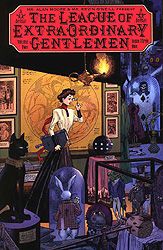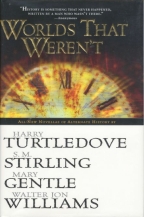Mood:
Now Playing: my banjo
Topic: Book Review
 I just finished THE STARS AND STRIPES TRIUMPHANT, by Harry Harrison. Normally I rather like Harrison's work, especially the more pulpy material like BILL THE GALATIC HERO, MAKE ROOM! MAKE ROOM! and STAR SMASHERS OF THE GALAXY RANGERS. The Stars and Strips series is a full-fledged jump into Turtledove's territory. The jumps in history are intriguing. The Mason-Slidell incident becomes cause celebre in Great Britain, tipping them into the cause of intervention. Alas, they intervene in the wrong place and slaughter a hapless outpost of rebs. This miraculously reconciles both sides of the ACW and unites them against our real foe, Great Britain. (the first book). The reunited Americans then smash British rule in the Eire, helping the suffering Irishmen establish a republic there. (second book). In the final book, VICTORIOUS, the Americans take the war to the UK itself. The title might be considered a spoiler.
I just finished THE STARS AND STRIPES TRIUMPHANT, by Harry Harrison. Normally I rather like Harrison's work, especially the more pulpy material like BILL THE GALATIC HERO, MAKE ROOM! MAKE ROOM! and STAR SMASHERS OF THE GALAXY RANGERS. The Stars and Strips series is a full-fledged jump into Turtledove's territory. The jumps in history are intriguing. The Mason-Slidell incident becomes cause celebre in Great Britain, tipping them into the cause of intervention. Alas, they intervene in the wrong place and slaughter a hapless outpost of rebs. This miraculously reconciles both sides of the ACW and unites them against our real foe, Great Britain. (the first book). The reunited Americans then smash British rule in the Eire, helping the suffering Irishmen establish a republic there. (second book). In the final book, VICTORIOUS, the Americans take the war to the UK itself. The title might be considered a spoiler. The VSF enthusiast in me revels at the advances of technology (and not huge ones either) that make the plot move forward-- culiminating in the use of tanks when the American forces attack the UK in 1867(!!!) However, the nascent little historian that I fear lurks in the heart of us all was outraged at Harrison's very liberal and convenient interpertation of the science, politics and social trends of mid-19th century America and Europe.
For one thing, the ironclads that Harrison considers so decisive against the Royal Navy were not exactly ocean-going vessels, and he has them escorting convoys and landing invasion forces. Absurd! The actual battle sections, although well-written, are tied up in a neat little bow before the first guy fires the first shot. I would have preferred a little more controversy-- that Sherman is a demigod of military planning, isn't he?
Finally (Spoilers!), we are supposed to believe that all these European nations that have been around for centuries are hungering for American forms of government (a constitution and elected representation) as the answer to all their ills.
In lieu of certain foreign entanglements the US is in at the moment (and that's the last comparison I'll make), I found the conclusions of this series to be a tad amusing in context.
In sum, fun, but horribly jingoistic and embarassingly rah-rah for the American side. I'd get it at the UBS of your choice.

 I just found this new collection of short stories by Gene Wolfe, who brought us the Long Sun/Short Sun series.
I just found this new collection of short stories by Gene Wolfe, who brought us the Long Sun/Short Sun series.  I saw this one in a library display of recent books, and picked it up. The NSFA reprints have been uniformly good, and this was no exception.
I saw this one in a library display of recent books, and picked it up. The NSFA reprints have been uniformly good, and this was no exception.
 A book by Alice Sebold
A book by Alice Sebold


 A collection of four novellas by Harry Turtledove, S. M. Stirling, Mary Gentle, and Walter Jon Williams. The recurring theme is the classic alternative history story.
Lately, I've been avoiding Turtledove like the plague, but he really returns to his strengths in his novella THE DAIMON, which is a "what-if" story set in the time period of the Pelopenessian War. The two lead characters are Socraters and Alicbediades, the same lead in TIDES OF WAR by Steven Pressfield. This is the best novella Turtledove has written in a long while.
I also recommend Mary Gentle's alt-history version of the Fall of Constantinople (several years later) entitled THE LOGISTICS OF CARTHAGE. This is a story in the same universe as her earlier ASH: A SECRET HISTORY. Probably the best written novella of the bunch.
I had given up on S.M. Stirling by the end of the first Draka book (though did try him again in that series he did with Drake sometime later), but found SHIKARI IN GALVESTON to be emminently readable, if not exactly the most skillful plot I've ever read. A good gap-filler, replete with the classic SM Stirling sex scenes.
The oddest story might be Williams' THE LAST RIDE OF GERMAN FREDDIE, which places Friedrich Nietzsche at the Gunfight at the O.K. Corral. Funny, but a trifle forced and artificial. Not as big of a fluff piece as SHIKARI is, but nothing heavy either.
As in most collections, you take the bad with the good. The Turtledove and the Gentle piece make this one worth the price of admissions!
Walt
A collection of four novellas by Harry Turtledove, S. M. Stirling, Mary Gentle, and Walter Jon Williams. The recurring theme is the classic alternative history story.
Lately, I've been avoiding Turtledove like the plague, but he really returns to his strengths in his novella THE DAIMON, which is a "what-if" story set in the time period of the Pelopenessian War. The two lead characters are Socraters and Alicbediades, the same lead in TIDES OF WAR by Steven Pressfield. This is the best novella Turtledove has written in a long while.
I also recommend Mary Gentle's alt-history version of the Fall of Constantinople (several years later) entitled THE LOGISTICS OF CARTHAGE. This is a story in the same universe as her earlier ASH: A SECRET HISTORY. Probably the best written novella of the bunch.
I had given up on S.M. Stirling by the end of the first Draka book (though did try him again in that series he did with Drake sometime later), but found SHIKARI IN GALVESTON to be emminently readable, if not exactly the most skillful plot I've ever read. A good gap-filler, replete with the classic SM Stirling sex scenes.
The oddest story might be Williams' THE LAST RIDE OF GERMAN FREDDIE, which places Friedrich Nietzsche at the Gunfight at the O.K. Corral. Funny, but a trifle forced and artificial. Not as big of a fluff piece as SHIKARI is, but nothing heavy either.
As in most collections, you take the bad with the good. The Turtledove and the Gentle piece make this one worth the price of admissions!
Walt

